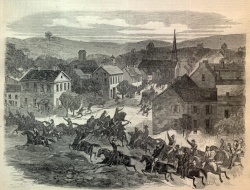Difference between revisions of "Portal:Inalienable Rights"
(changed name of portal to Inalienable Rights. Introduction needs to be changed) |
m (Jeff moved page Portal:Our Common Law Heritage to Portal:Inalienable Rights without leaving a redirect: renaming the portal) |
(No difference)
| |
Revision as of 19:58, 26 January 2014
Inalienable Rights
|
American independence owes much to English Common Law. The majority of the colonists were English who would eventually insist on being treated as English subjects in that, English subjects enjoyed rights that were conferred by the English constitution. And the English constitution rested on Common Law. From the beginning of the English colonies in America, there was conflict between the interest of the colonists and the interests of the English crown and the chartered companies behind the colonies. Parliament created a number of Acts that regulated and taxed colonial trade in ways that were expensive for the colonists - and, in which, the colonists had no voice. For more than a century, these conflicts could be, and were, ignored when they interfered too greatly in the ability of the colonists to pursue their economic interests. In the mid 18th century, a point was reached at which one or the other would have to prevail. In that time leading up to American independence, influential arguments were made in colonial court cases pressed by English authorities that relied less on specific legal arguments and more on appealing to the rights conferred by English Common Law. The colonists wanted the rights of subjects living in England. They had little interest in independence until it appeared to be the only way to achieve them. This portal is the place to assign categories and pages that present and discuss the link between American independence and English rights. |
 Morgan's Raiders entering Washington, Ohio in August, 1863 |
Categories and contentsClick on arrows to see subcategories and articles. Things you can doHere are some things you can do:
|
Sand Box
|